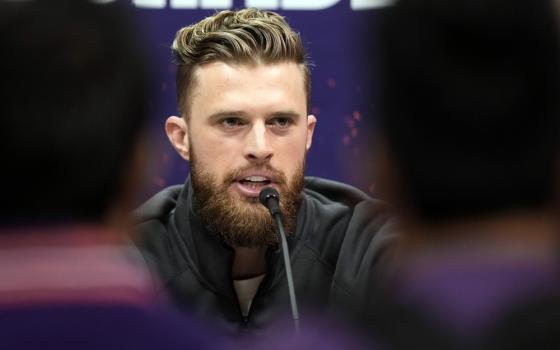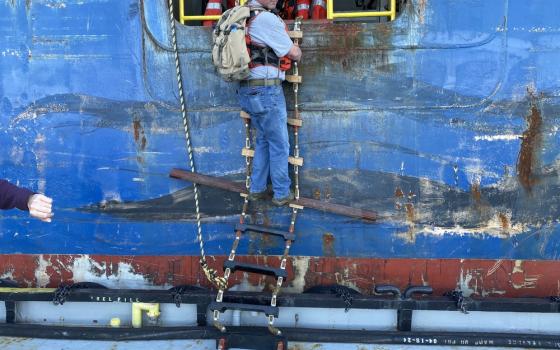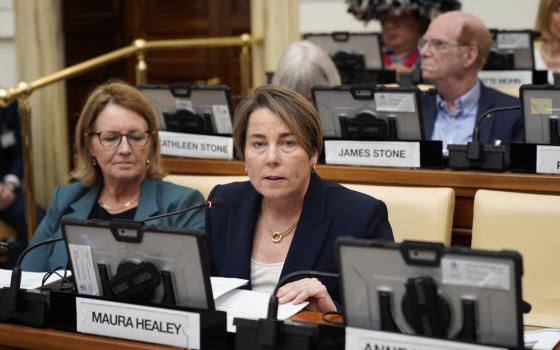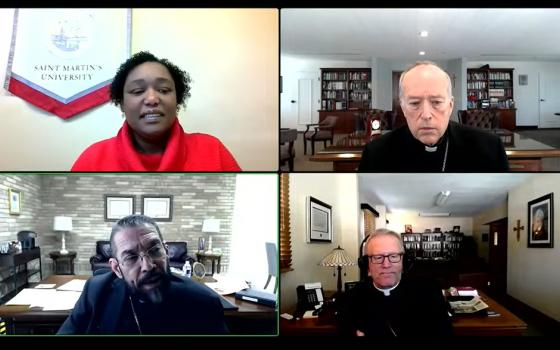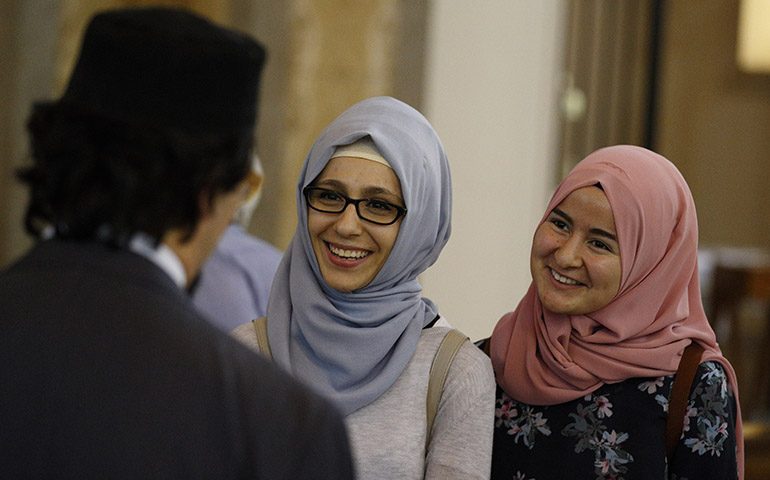
Serife Demir and Sukriye Ozmen, who are Muslim students, chat with a guest after a prayer service in remembrance of the victims of the Orlando, Fla., terrorist attack at St. Patrick's Church in Rome June 16. The event was planned by the U.S. embassy to the Vatican in conjunction with the Santa Susanna Parish for U.S. Catholics in Rome. (CNS/Paul Haring)
My first recollection of a religious holiday as a Muslim child in the Middle East was actually of Christmas. My parents, not wanting me and my siblings to feel out of place or "different" in the British expatriate school we attended, placed gifts under our beds for us to wake up to on Christmas morning.
This did not mean we were Christian or agnostic -- far from it. We were fully aware we were Muslims, yet we were part of an Arab Muslim middle class in the Middle East, who along with fellow Arab Muslims of more or less means, were tolerant, open-minded and completely oblivious to any radical or extremist distinctions between Muslim and Christian or between Muslim Sunni and Shiite.
This attitude continued through our teenage years in Lebanon, even during the Lebanese Civil War of 1975-1992. While there was a Muslim vs. Christian element to that conflict, it was always at a political level and never really seeped into or established roots in the thinking of the general population. While fewer Muslims resided in the "Christian" half of Lebanon during the war, on the "Muslim" side many Christians lived and worshipped freely and safely, and it was not uncommon to hear church bells tolling on Sunday in "Muslim" West Beirut.
This is the silent but largely unheard majority often spoken about among Muslims. We don't necessarily pray five times a day, nor do women in our families usually wear a hijab (although the hijab has seen a resurgence in the past 20 years or so but more as part of a religious re-awareness as opposed to adhering to radical thought).
Many of us do fast during Ramadan and are very proud of being Muslim, yet we remain moderate and open-minded in our thinking and way of life. Among our friends, mates and wives/husbands are Christians and Jews, homosexual and heterosexual. We don't judge or discriminate, we just live and let live.
We have watched over the years the many different manifestations of the extreme minority of radical extremists who have severely tarnished our religion, most lately culminating in the Islamic State, and we feel absolutely no connection to them or their beliefs. They are foreign and repulsive to us. They do not represent us or the religion of peace that Islam fundamentally is.
Instead, they have grotesquely distorted religion and Scripture, ignorantly cherry-picking verses from the Quran to justify the unjustifiable. They are no more Muslim than any violent group who professes adherence to Christianity is Christian, such as the KKK, the Lord's Resistance Army in Uganda or the Oklahoma federal building bomber Timothy McVeigh.
My family immigrated to the United States in the late 1980s, to Orlando where we established roots and the city became our new American hometown. While I personally moved on to the Washington, D.C., area, my immediate family remained there and I still refer to Orlando as "home."
It is because of this feeling of home that the horrific massacre at the LGBT club Pulse in Orlando has struck me so deeply. All violent deaths are equally tragic and senseless whether in Orlando or elsewhere, but this particular outrage felt like someone had violated me personally, had entered the sacred space of home we all feel and desecrated that space. It is for this reason that because of this particular horror I've felt not only sadness but also grief.
Millions of words, spoken and on paper will be dedicated to analyzing, probing and pontificating on the reasons for the massacre at the Pulse nightclub. Most of the writing will be way off mark, offensive to Muslims in general and bigoted, and will play right into the hands of radical extremists preying on confused, weak and vulnerable Muslims.
This we cannot control. What we can control as Muslim Americans, whether immigrant or American-born, is to shape the narrative of who we are and what we stand for. It is not enough to simply condemn the acts of violence committed in our religion's name and then shake our heads when demagogues like Trump recommend a ban on all Muslims entering our country, the United States.
We must be proactive in defining what our religion really stands for in word and in action. We have a tendency to get defensive when such violent acts are committed in Islam's name, and retreat into our own communities. Or we simply react in shame and sorrow at the latest act, while waiting for a future one to inevitably follow, wincing when we hear of an attack on TV, hoping that the name of the perpetrator or group will not be Arab or Muslim. While understandable, that is not the answer.
We chose the United States as our adopted home because our homes in our former countries became unlivable for one reason or the other, and we must fully embrace our being American along with our roots and unique culture. One does not negate the other.
Despite the tragedy, Orlando, my American hometown, can serve as a teaching moment for Muslim Americans. If we focused on three small objectives that are achievable for us both as individuals and as a community, I believe we can make a measurable difference.
The first objective is embracing being American. Too often we confuse being American with an erosion or rejection of our native culture and mores. It is quite the contrary. America is the land of immigrants, a melting pot of many diverse cultures and peoples, all contributing to what makes this country unique and strong.
Assimilation means developing a hybrid of what is good from our mother countries (family values, importance of education, respect for elders) and our adopted home (democracy, justice, rule of law) and engaging in every aspect of American life as Muslim Americans, rather than retreating defensively into our own culturally fenced-off communities.
Assimilating also means understanding and respecting that all are equal in America -- black, white, Muslim, Christian, Jew, atheist, agnostic, or LGBT. It means standing shoulder to shoulder with communities that are discriminated against, as we are discriminated against today. One of the largest Muslim-American organizations, the Council on American-Islamic Relations, took an admirable stand in the wake of the Orlando tragedy by expressing solidarity with the LGBT community in the wake of the attack and even urged Muslims to donate blood for the injured victims.
The second achievable objective is in educating our fellow non-Muslim Americans to the fact that Islam is not a "foreign" religion but part of the Abrahamic tradition; in fact, it is the third pillar of the Abrahamic monotheistic line of faiths, alongside Judaism and Christianity.
As such, one critical step to take is to stop inserting the Arab translation for the word God, "Allah," into conversation or writing related to Islam that is conducted in English. Allah is simply the translation in the Arabic language of the word "God." Arab Christians and Muslims use "Allah" when referring to God in Arabic, both in word and in Scripture, in mosque and church, and in personal prayer. What Allah is not is the Muslim God, no more than "Dieu" is the "French God" or "Dios" the "Spanish God."
It is bad enough that the U.S. media, politicians and pundits routinely reinforce this dangerous and misleading fallacy. As Muslim Americans we should not be adding to it ourselves.
Finally, we should encourage critical thinking in Islam that makes us think rather than fall back on feel-good narratives that create comfort bubbles and inhibit thought. This is not to say that we should doubt the words of the Quran, which to Muslims is the literal word of God as passed on by the angel Gabriel to the prophet Muhammad. Instead it is to follow in the steps of Muslim philosophers such as Al-Farabi, Ibn Rushd, Ibn Arabi and Ibn Khaldun and engage in healthy debate about women's rights, sectarian divisions, diversity, violence conducted in our name, and, yes, even homosexuality.
It is astonishing that since the last of these great philosophers Ibn Khaldun, died in 1406, over 612 years ago, there has been little to show in terms of mainstream critical thinking and Islamic philosophy. It is time for that silent majority of Muslims, who overwhelmingly make up the world's Muslims, to pick up the mantle of these philosophers, and in both action and word, wrest away our beautiful religion from the poisonous few among us who have so tarnished its image.
[Ra'fat Aldajani is a Palestinian-American businessman and political commentator.]





